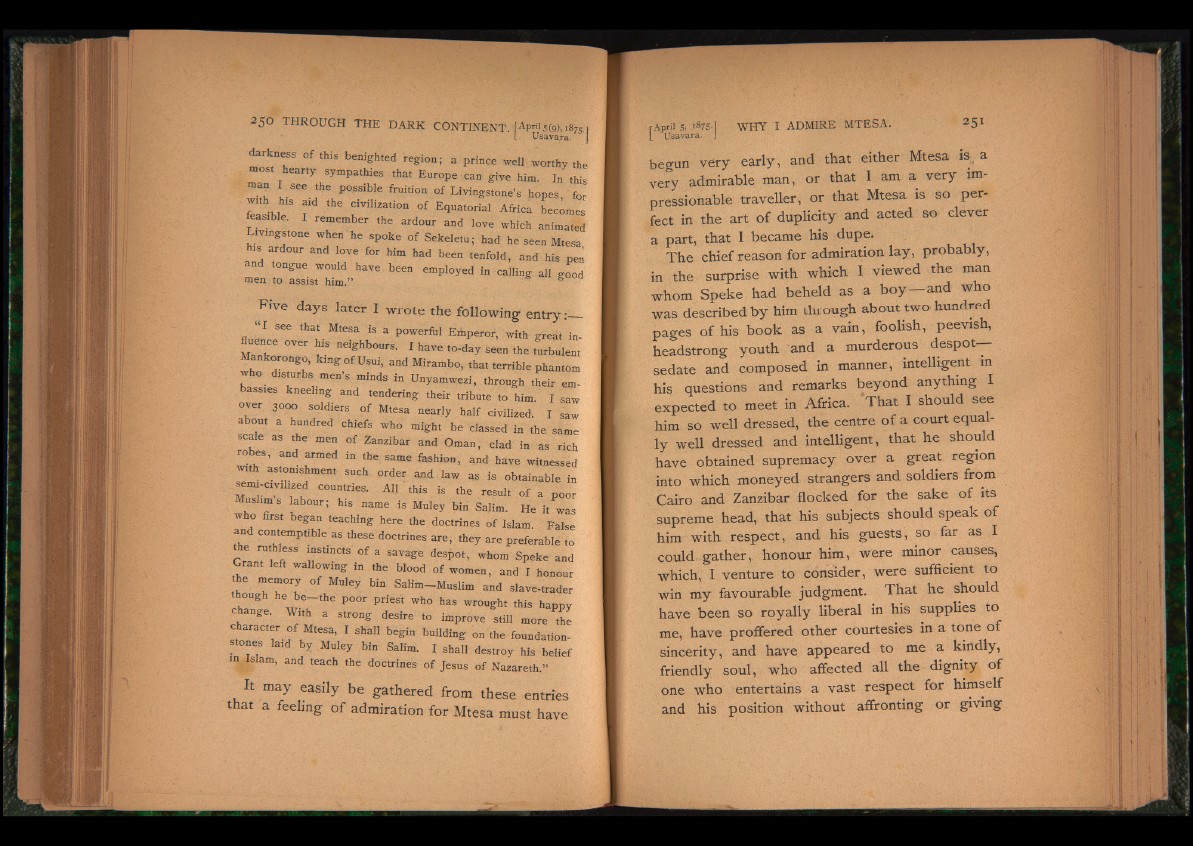
darkness of this benighted region; a prince well worthy the
ThCarty syrnPathies that Europe can give him. In this
" T ! . SCe !hC P°Ssible fruition of Livingstone’s hopes, for
with. hts aid the civilization of Equatorial Africa becomes
feasible. I remember the ardour and love which animated
Livingstone when he spoke of Sekeletu; had he seen Mtesa
his ardour and love for him had been tenfold, and his pen
and tongue would have been employed in calling all good
men to assist him.” S
Five days later I wrote the following entry:—
“ I see that Mtesa g a powerful Emperor, with great influence
over his neighbours. I have to-day seen the turbulent
who d^0^Ilg^ Usui> and Miramb°, that terrible phantom
who disturbs men’s, minds in Unyamwezi, through their embassies
kneeling and tendering their tribute to him. I saw
over 3000 soldiers of Mtesa nearly half civilized. I saw
about a hundred chiefs who might be classed in the same
scale as the men of Zanzibar and Oman, clad in as rich
robes, and armed in the same fashion, and have witnessed
with astonishment such order and law as is obtainable in
semi-civilized countries. All this is the result of a poor
Muslims labour; his name is Muley bin Salim. He it was
w o first began teaching here the doctrines of Islam. False
and contemptible as these doctrines are, they are preferable to
e ruthless instincts of a savage despot, whom Speke and
Grant left wallowing in the blood of women, and I honour
he memory o f Muley bin Salim-Muslim and slave-trader
h Ug C-„r e the P° ° r priest who has wrought this happy
change. With a strong desire to improve still more the
character of Mtesa, I shall begin building on the foundation,
tones laid by Muley bin Salim. I shall destroy his belief
in . Islam, and teach the doctrines of Jesus of Nazareth.”
ft may easily be gathered from these entries
that a feeling o f admiration for Mtesa must haye
rApril 5, 1875.I WHY I ADMIRE MTESA. 2 5 1
L Usavara. J
begun v e ry early, and that either Mtesa is a
very admirable man, or that I am a v e ry impressionable
traveller, or that Mtesa is so perfect
in the art o f duplicity and acted so clever
a part, that I became his dupe.
T h e chief reason for admiration lay, probably,
in the surprise with which I viewed the man
whom Speke had beheld as a b o y— and who
was described b y him through about two hundred
pages o f his b o o k as a vain, foolish, peevish,
headstrong youth and a murderous despot
sedate and composed in manner, intelligent in
his questions and remarks beyond anything I
expected to meet in Africa. ‘That I should see
Vitm SO well dressed, the centre o f a court equally
well dressed and intelligent, that he should
have obtained supremacy over a great region
into which moneyed strangers and soldiers from
Cairo and Zanzibar flocked for the sake o f its
supreme head, that his subjects should speak o f
him with re spe ct, and his gu e s ts , so far as I
could gather, honour him, were minor causes,
which, I venture to consider, were sufficient to
win my favourable judgment. That he should
have been so ro y a lly liberal in his supplies to
me, have proffered other courtesies in a tone o f
sincerity, and have appeared to me a kindly,
friendly soul, who affected all th e -d ign ity o f
one who entertains a vast respect for himself
and his position without affronting or giving